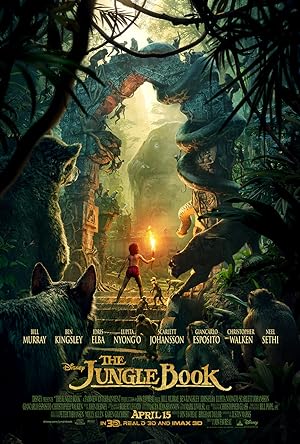Jon Favreau’s recent adaptation of The Jungle Book is a must see delight for adults and children. The Jungle Book is about a human boy, Mowgli, brought up by wolves and faced with the choice of leaving his adopted home and returning to the unknown world of men or confront a vengeful tiger, Shere Khan.
I did not see The Jungle Book in theaters because the revamping of classic animated Disney movies as live action with heavy doses of CGI seemed like a cynical money grab, but everyone who saw it said it was good so I added it to my queue. Then when I started to watch The Jungle Book, I asked myself what the hell I was thinking watching a movie where animals are in danger, which is the only thing that can put me into a crying inconsolable fetal position long after the movie ends. Still I steeled myself to finish what I started and am glad that I did so.
Jon Favreau’s work is generally remarkable, but the voice acting by Idris Elba, Bill Murray, Christopher Walken and Ben Kingsley makes The Jungle Book an instant classic. Favreau borrows elements from other classic Disney movies such as The Lion King and more mature dramatic features to add texture to The Jungle Book.
I was pleasantly surprised to find The Jungle Book a highly germane film for the challenges that we face in our time. The Jungle Book is a film about how each character faces and confronts fear: through tyranny or solidarity. Khan isn’t wrong about human beings. They do threaten the lives of every animal in the jungle. Mowgli isn’t wrong to want to fight Khan because he also threatens the lives of every animal with his overreaching quest for security.
The Jungle Book depicts tyranny as the over-reaction to perceived threats and hurts more people than it protects. The Jungle Book depicts solidarity as a collective reaction that addresses a specific real and present danger. Mowgli’s journey is not to the world of man, but a journey of self-discovery regarding his origins, his upbringing and the essential necessity of destroying his worst impulses while retaining those childhood values while not betraying your true self or those you love. The essential difference between Mowgli and Khan is the ability to recognize and react appropriately to the horrific reaction in the faces of those they claim to protect. Khan enjoys their fear. Mowgli does not. “Whoever fights monsters should see to it that in the process he does not become a monster.”
I was almost moved to tears by the law as recited by Mowgli, Bagheera, Baloo, Raksha and all the animals, “This is the law of the jungle as old and as true as the sky. The wolf that keeps it may prosper, but the wolf that breaks it will die. Like the creeper that girdles the tree trunk, the law runneth over and back, and the strength of the pack is the wolf and the strength of the wolf is the pack.” When facing destruction, all different groups must immediately band together instead of retreating to their separate enclaves out of a misguided sense of safety that can easily lead to being destroyed and picked off individually. As a pack, we can overcome fear, and while some may die, no scarred tiger can kill us all, and no fire of hate can consume us all.
Stay In The Know
Join my mailing list to get updates about recent reviews, upcoming speaking engagements, and film news.





